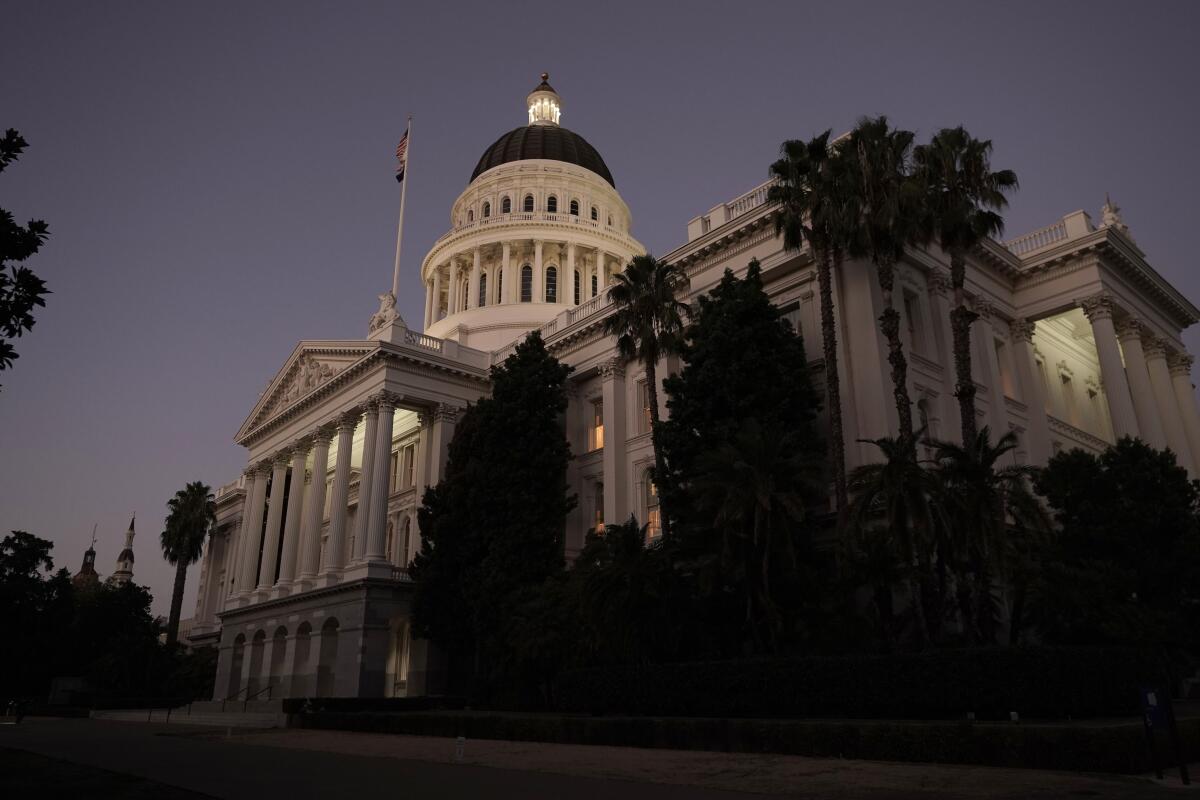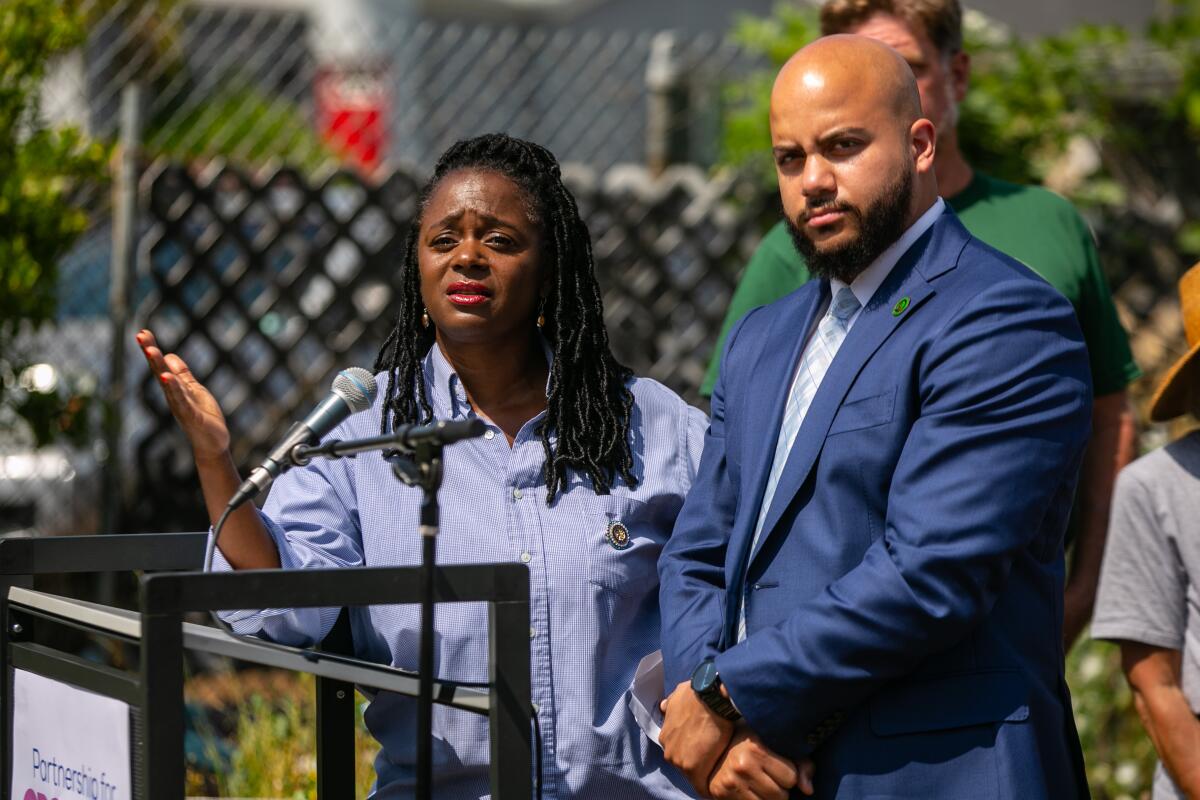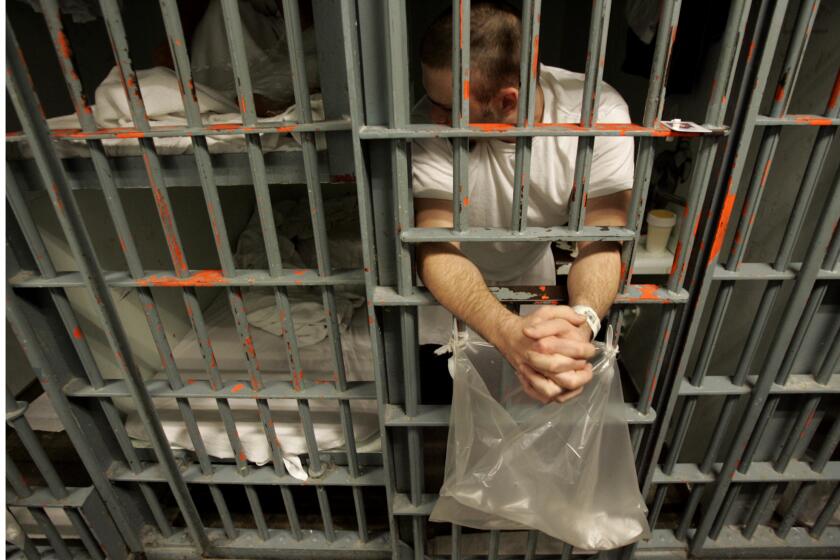California Legislature passes bills to curb retail theft over objections from some Democrats

- Share via
SACRAMENTO — California lawmakers on Monday gave final approval to a package of 10 bills meant to combat retail theft, an effort that divided Democrats as they confronted key issues in the upcoming November election.
California lawmakers passed these bills to address crime:
AB 2943 allows felony charges on the third theft offense, aggregates dollar amounts and expands drug diversion programs.
AB 3209 allows a court to impose a restraining order for up to two years against a person who has stolen, vandalized or committed battery against an employee. It would also require the court to consider whether a person lives in a “food desert” and whether the store is the only location for necessities.
AB 1779 allows prosecutors to charge several offenses that took place across counties and handle them in a single court.
AB 1802 makes permanent the California Highway Patrol property crimes task force.
AB 1972 expands the California Highway Patrol’s property crimes task force program to include cargo theft and railroad police.
SB 905 creates two new “wobbler” offenses that can be charged as felonies or misdemeanors: breaking into a car with the intent to steal, and possessing property stolen from a car worth at least $950 with the intent to sell it.
SB 1242 gives a stiffer sentence to people convicted of setting a fire on a retailer’s property to commit organized theft.
SB 1416 creates a sentencing enhancement for selling, exchanging or returning for value an item acquired through shoplifting, burglary or theft.
SB 1144 requires online marketplaces to collect information from high-volume third-party sellers and grants authority to district attorneys to bring civil actions to enforce violations.
SB 982 eliminates an end date on the crime of organized retail theft, allowing prosecution to occur indefinitely.
The legislation has been the focus of intense political debate all year, with Gov. Gavin Newsom and legislative leaders responding to the pressure created by a tough-on-crime ballot measure that would stiffen penalties for retail theft. Democratic leaders were hopeful their bills could sway prosecutors to drop the measure, but negotiations collapsed, leaving California with two different visions for addressing crime. The district attorneys’ more punitive approach that seeks to charge people with felonies for repeated theft and fentanyl offenses will appear on the November ballot as Proposition 36, while the Legislature’s effort to curb crime by targeting organized theft rings and online marketplaces now heads to Newsom for his signature.
“Retail theft is not only bad for business, it also undermines safety,” Assemblymember Rick Chavez Zbur (D-Los Angeles), who leads a special committee created this year to address the issue, said during Monday’s vote on the Assembly floor. “I appreciate that there is a wide range of views in this body and the community, but getting this to the right place has been complicated. Many members of this body have raised concerns that are passionate and authentic, and I respect them.”
Though the bills passed with bipartisan support, they were opposed by many progressive lawmakers, particularly members of the Legislative Black Caucus who don’t want to see more people sent to prison.
“These measures deepen mass incarceration, and deepening mass incarceration is going in reverse of where Californians wanted us to go, which is to decarcerate,” Sen. Lola Smallwood-Cuevas (D-Los Angeles) said Thursday as she voted against a bill that would penalize repeat thieves and aggregate the dollar value of stolen merchandise.
Assemblymember Mia Bonta (D-Alameda) withheld support on seven bills.
“We know that increased criminalization too often falls on the backs of Black and Latino Californians,” she wrote in a statement to The Times.
Assemblymembers Tina McKinnor (D-Hawthorne) and Isaac Bryan (D-Los Angeles), also members of the Black caucus, were the only legislators to cast “no” votes on the Assembly floor on a bill that would create two new crimes: breaking into a vehicle with the intent to steal and possessing property thus stolen with the intent to sell it.
Thirteen other Democrats did not cast votes, a signal that they do not support the bill.

Some Black caucus members and several other Democrats also did not support legislation to increase penalties for people who cause a fire in the act of committing a property theft; allow prosecutors to aggregate property thefts; and allow stores to file temporary restraining orders against certain repeat offenders.
How California will track whether the legislation is effective in reducing theft was not immediately clear.
“This is not over, this is the first year, the first step,” Assembly Speaker Robert Rivas (D-Hollister) told reporters Monday. “We know data is always the best way to drive policy, but we have to do a much better job in the state Capitol at looking in the rearview mirror to make sure laws are working.”
A measure to impose harsher penalties for drug possession and theft, altering the controversial Prop. 47 passed in 2014, has qualified for November’s ballot.
Newsom has already signed two other bills in July that lawmakers crafted as part of a related effort to address drug addiction. The Senate is also advancing seven other fentanyl-related bills to stem the ongoing drug crisis plaguing the state.
At the crux of the debate over the bills to curb theft and fentanyl abuse are diverging views of Proposition 47, a decade-old California law that downgraded some nonviolent drug and property crimes from felonies to misdemeanors, with a goal of shrinking the prison population and giving nonviolent offenders a second chance.
Many district attorneys and law enforcement officials blame Proposition 47 for crime in California and are backing Proposition 36 on the November ballot to reverse some of the reforms. Proposition 36 would allow people repeatedly convicted of theft or fentanyl use to be charged with felonies and potentially sent to prison. The campaign announced endorsements Monday from several legislative Democrats, including Sens. Josh Newman (D-Fullerton), Melissa Hurtado (D-Sanger), Susan Rubio (D-Baldwin Park) and Tom Umberg (D-Orange), as well as Assemblymembers James Ramos (D-Highland), Jasmeet Bains (D-Delano), Stephanie Nguyen (D-Elk Grove) and Blanca Pacheco (D-Downey).
Proposition 36 on California’s November ballot asks voters to change parts of Proposition 47, an initiative passed in 2014 that turned some felonies to misdemeanors.
Newsom and legislative leaders have tried to prevent Proposition 36 from reaching the ballot and are likely to announce their official opposition to it. They don’t want to change Proposition 47, arguing that it created beneficial reforms that have reduced California’s prison population and provided funding for drug treatment and other rehabilitative services. They say California can address crime without changing Proposition 47.
In June, the governor and Legislature introduced a more liberal, less punitive ballot measure that was meant to compete with the prosecutors’ measure. But just before the Legislature left for its July recess, the governor, who was out of state campaigning for President Biden at the time, pulled the measure, saying that there wasn’t enough time to get it over the finish line.
The legislation heading to Newsom may come with some political benefits for opponents of Proposition 36: Rivas said he thinks it could prompt some corporate donors to yank their support.
More to Read
Sign up for Essential California
The most important California stories and recommendations in your inbox every morning.
You may occasionally receive promotional content from the Los Angeles Times.













